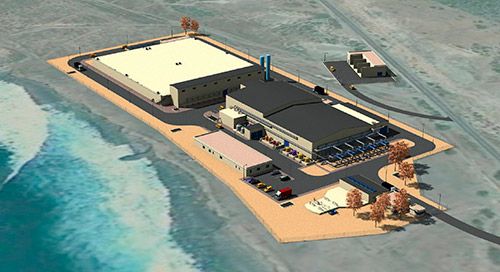Desalination Plant in Agadir to Run Entirely on Green Energy
Published on by Water Network Research, Official research team of The Water Network in Technology
Morocco is to build the world’s largest desalination plant that will run entirely on solar energy in a bid to offset water needs in the semi-arid southern region.

Image source: Middle East Online
Morocco and Abengoa, a Spanish energy firm, signed a contract for the construction of a desalination plant and the development of an irrigation project in the Agadir region. The contract, which adds to one signed in 2014, outlines the construction of a plant with a production capacity of 100,000 cubic metres of water per day.
The $364.6 million seawater plant is expected to produce 450,000 cubic metres of water per day. However, it will initially begin with a production of about 275,000 cubic metres per day, 150,000 cubic metres of which would be for consumption and 125,000 cubic metres would be used for irrigating 13,600 hectares of agricultural fields in the Chtouka region.
Moroccan Minister of Agriculture and Fisheries Aziz Akhannouch said the project “is a lever for a sustainable socio-economic growth for the whole region.”
The Chtouka region employs about 100,000 people in the agricultural sector, which generates $1 billion. However, its water resources are under threat, which prompted the Moroccan government to act.
The plant is expected to cover the needs of more than 70,000 inhabitants, providing about 3.8 cubic metres water per day per person.
Abengoa will be responsible for the plant’s construction, development and maintenance of its infrastructure for at least 27 years.
The seawater desalination plant will be the largest solar-powered plant in the world. Moroccan leaders said the Noor Ouarzazate solar power station would be fully responsible for supplying it.
Desalination of seawater appears to be one of Morocco’s strategies to tackle the effects of climate change and meet chronic water shortages. The desalination plant is a major step for Morocco towards sustainable development, preserving its underground resources and promoting clean energy.
Cycles of drought over the last ten years in Morocco have been a major a cause for concern. The country’s population is expected to reach 38 million in 2030, meaning an increase in food and water consumption.
Read full article: Middle East Online
Media
Taxonomy
- Water Scarcity
- Water Access
- Water Supply
- Water Scarcity In Desert area
- Energy
- Energy Reduction
- Desalination
- Energy Efficiency
- Sea Water Desalinisation
- Sustainable Desalination
- Access
- Water Supply
- Desalination